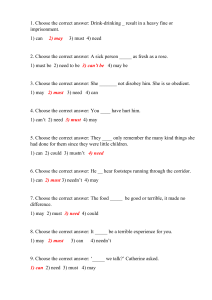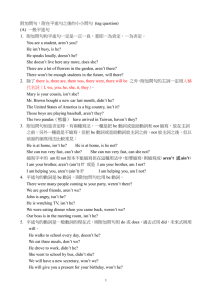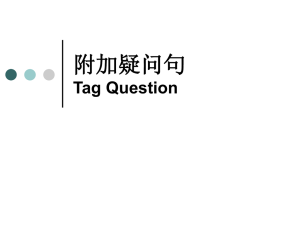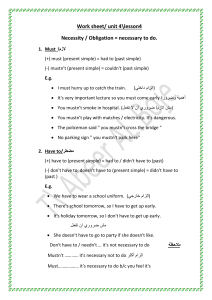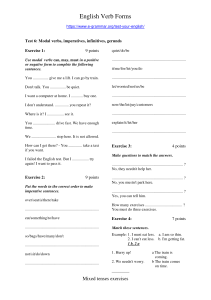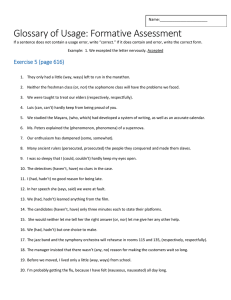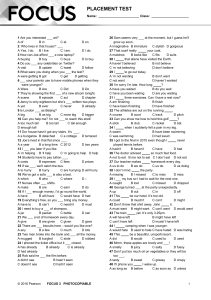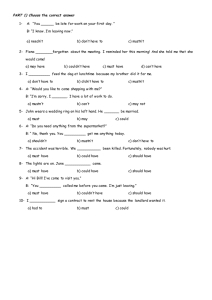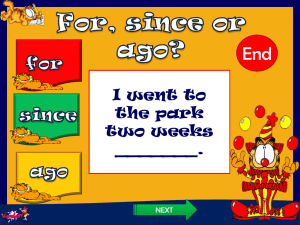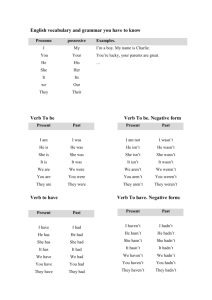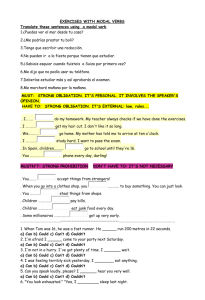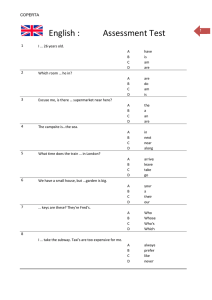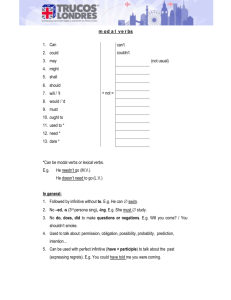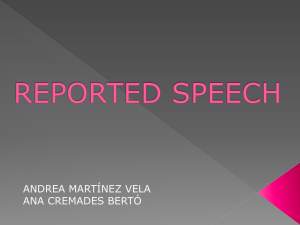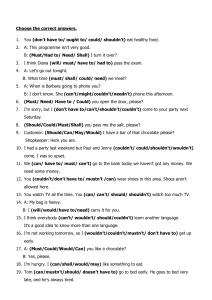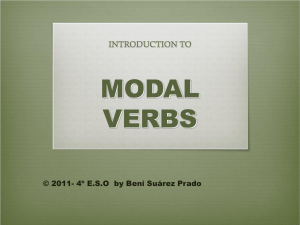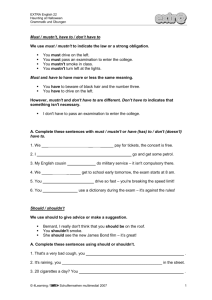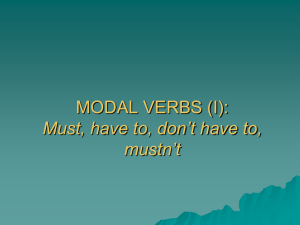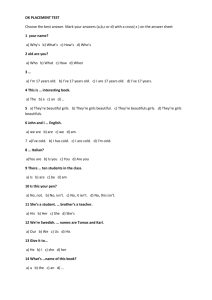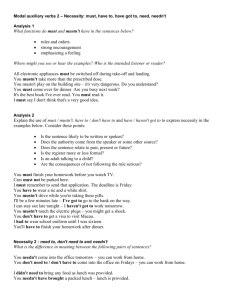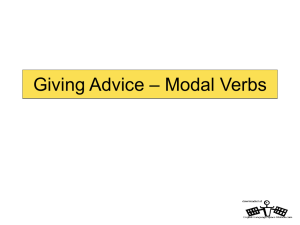反意疑问句
advertisement
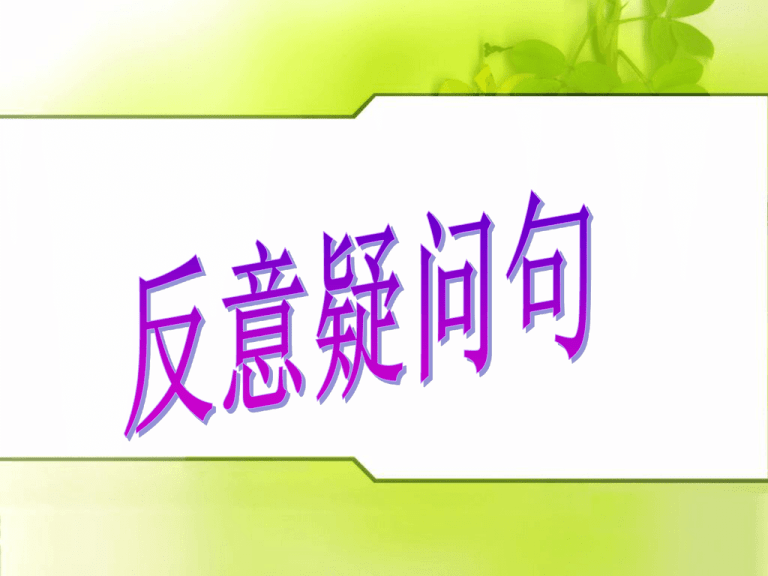
反意疑问句,也叫附加疑问句。主要由 “陈述句+附加疑问句”构成。用以要求 对方证实所述之事。 附加疑问部分的动词及主语一般要与陈述部分 的动词及主语相对应;如果陈述部分的主语是 名词,附加疑问部分则相应地用代词表示。附 加疑问部分必须用省略句,且保留两个单词。 这是一般规则。 陈述句+疑问部分? 肯定 否定 否定 肯定 isn’t he He is a doctor, _______? doesn’t she She likes English, __________? Tom didn’t have lunch, ________? did he have you You haven’t finished it, _________? 反意疑问句的前后两部 分在时态,人称和数上 都要保持一致。 isn’t he Your father is unhappy, ________? isn’t he The man is dishonest, _________? 1.反意疑问句的陈述部分含有由un-, im-, in-, dis-, 等否定意义的前缀构成的词语 时,陈述部分要视为肯定意义,问句部分用 否定形式. does he? He never watches TV, __________ can he(they)? No one can help me, ______________ Very few people understand what he said, do they? ____________ 2.陈述部分如有表示否定意思的某些词, 如: never, seldom, hardly, few, little, nobody, no one, nothing……, 疑问部分须用肯定. I am having an English lesson, aren’t I ? _________ 3. 陈述部分是I am 或 I’m 时, 疑问部分用 aren’t I. l’ m late, _________ aren’t I ? didn’t he? He said that they were happy, __________ didn’t he? Tom told us that Lily was ill, __________ The teacher said that you hadn’t finished didn’t he? your homework, __________ 4、复合句的反意疑问句一般是根据 主句的主语和谓语形式构成反意疑问 句的。 isn’t he I suppose he is serious, _______? can you I don’t think that you can do it, _______? 5. 复合句的主句是I think (expect, suppose, believe, imagine)结构时,形成的否定转移句 式,即把从句的否定移到主句,反意问句要与 宾语从句的主语和谓语保持一致,并且要注意 否定转移。 isn’t he I believe that he is right, _______? 注意:此句式的主语不是第一人称时,反意问 句与主句的主语和谓语保持一致。 don’t you You think she is a good teacher,__________? Nothing can stop him learning English, can it _______? Something is wrong with your computer, isn’t it ______? isn’t he Everyone is here, _________? 6.陈述部分主语是everyone, everybody, someone, somebody, anybody, no one, nobody等时,疑问部分用they/ he; 陈述部分是everything, something, nothing, anything时,疑问部分用 it. shall we? Let’s go, _________ shall we? Let’s have a cup of tea, __________ will you? Let her play the piano, __________ will you? Let us sing a song for you, __________ 7.在Let’s祈使句后加上 shall we? shan’t we?, 在 Let us(me, him..) 后加上 will you? 或 won’t you? Speak louder, will you?/won’t you? Don’t wait for me, will you? Don’t be late, will you? 8.在肯定的祈使句后,用 will you? would you? won’t you? 在否定的祈使句后,只能用 will you? There is something wrong with the TV, _________ isn’t there? There won’t be any meeting next week, __________ will there? 9.陈述部分是“there be”结构时, 疑问部 分的主语仍用there替代主语代词. 10. must如何构成反意疑问句 当陈述句部分有情态动词must时,反意疑问部 分有四种情况: (1)must表示“必须、禁止”时,反意疑问 部分要用must (mustn’t) 。 You mustn’t stop your car here, must you? (2)must表示“有必要”时,反意疑问句部 分要用needn’t。 They must finish the work today, needn’t they? he He must work hard, mustn’t __________? needn’t you You must phone your father, ___________? (3)当must用来表示对现在的情况进 行“推测”时,反意疑问部分要根据 must后面的动词采用相应的形式。 He must be good at maths, isn’t he? It must be going to rain tomorrow, ________? won't it (4)当must用来表示对过去的情况进行“推测” (must + have done)时,如强调对过去情况 的推测(一般句中有过去的时间状语),反意 疑问句部分要用“didn’t + 主语”;如果强调动 作的完成(一般没有过去时间状语),反意疑 问句部分要用“haven’t / hasn’t + 主语”。 She must have read the novel last week, didn’t she? You must have told her about it, haven’t you? 11. 一些特殊动词的反意疑问句的构成形式 1) used to do 反问用 usedn’t/ didn’t There used to be a house, ________________? usedn’t/ didn’t there 2) ought to 反问用ought或should shouldn’t you You ought to cook for me, oughtn’t/ __________________? 3) had better + v. 疑问句部分用hadn't you? You'd better read it by yourself, __________? hadn’t you 4) have to 反问用do don’t you You have to go there, _________?
